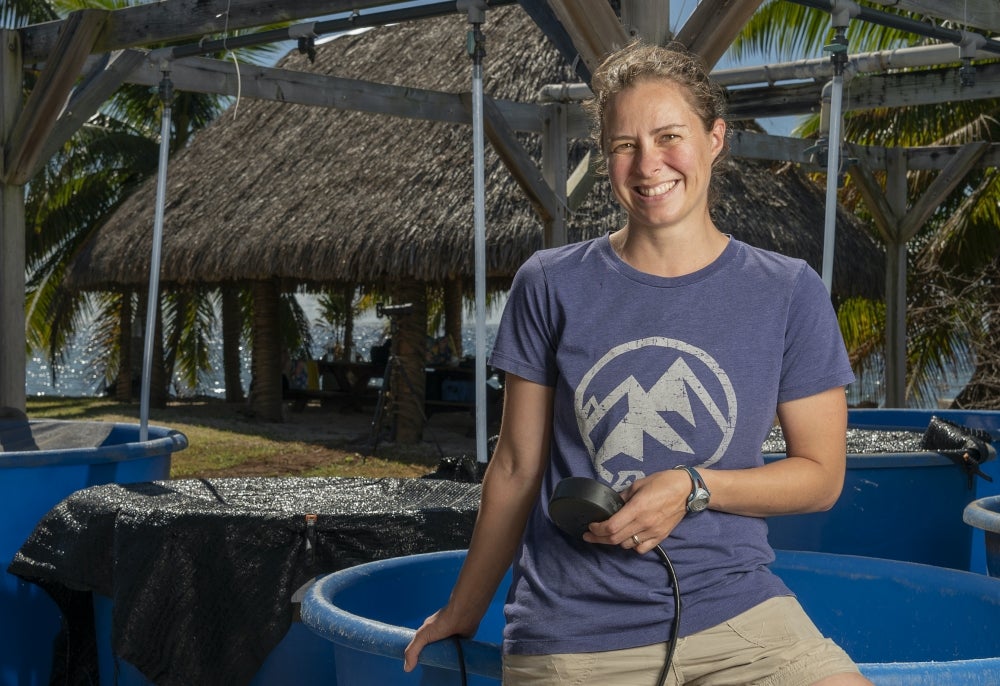
Double the Recognition
It’s one honor after another for UC Santa Barbara’s Erika Eliason. The assistant professor in the Department of Ecology, Evolution and Marine Biology (EEMB) has been recognized by two research societies for her work in ecological and evolutionary physiology.
The Society for Experimental Biology (SEB) has awarded Eliason the 2021 President’s Medal, extended to early-career researchers who demonstrate scientific leadership, esteem among their peers and creative and novel thinking. The Canadian Society of Zoologists (CSZ) has bestowed Eliason with this year’s Boutilier Award for Best Early Career Researcher. Recipients are chosen for their significant contributions to zoology and for their potential as a “rising star” in their field.
Eliason will give keynote talks at both societies’ main meetings this coming spring and summer.
“It has been a real honor to win these awards,” Eliason said. “I went to numerous CSZ and SEB meetings as a graduate student and postdoc and always looked forward to the plenary lectures by the Boutilier and President Medal Award winners. Some truly amazing and inspiring scientists have previously won these awards.”
“For Erika to receive these two awards simultaneously is wonderful recognition by her peers and testament to her creativity, leadership and distinction in studying how animals respond to environmental challenges,” said EEMB chair Scott Hodges. “She thoroughly deserves these honors and we are so lucky to have her here at UCSB.”
Eliason studies the effects on fish of environmental stressors like heat. “I’m trying to figure out which fish are most vulnerable to climate change and which are more likely to succeed,” she said.
Growing up camping and fishing in the mountains and forests of British Columbia, Eliason remembers especially enjoying trolling for rainbow trout with her grandfather. “I have such fond memories of loading his little boat on the back of the trailer, driving out to the lake, getting out all the gear, selecting just the right fly from Grandpa’s special fly box,” she recalled.
This passion led her to study salmonids of the Pacific Northwest, with a special focus on how different species, populations and even individual fish cope with thermal stress. Through her research, Eliason discovered that salmon populations are adapted to their local environments. Thermal tolerance differs among populations, across their life cycle, and between sexes within a single watershed.
More recently, Eliason has extended her research to different species of fish and other cold-blooded animals, various mechanisms of thermal tolerance, and other human-caused stressors beyond temperature. “It has been fun growing my lab and tackling different research questions around the globe,” she said.
“Erika tackles critical questions for understanding global change biology by expertly weaving together disparate lines of inquiry including field, experimental, physiological and molecular approaches,” said Hodges. “Her research has had even further reach as it addresses critical economic and conservation concerns.”
Eliason’s findings can pinpoint the amount of stress different fish can handle, as well as identify the populations or life stages that are most resilient or most vulnerable to climate change. Her work with Pacific salmon in Canada helped identify the optimal temperature range for migrating adult sockeye salmon. If the water exceeds these temperatures, managers can close the fishery to allow more fish to successfully reach their spawning grounds, explained Eliason, who also provides her expertise to help managers with fish passage design.



